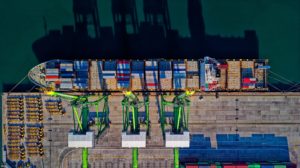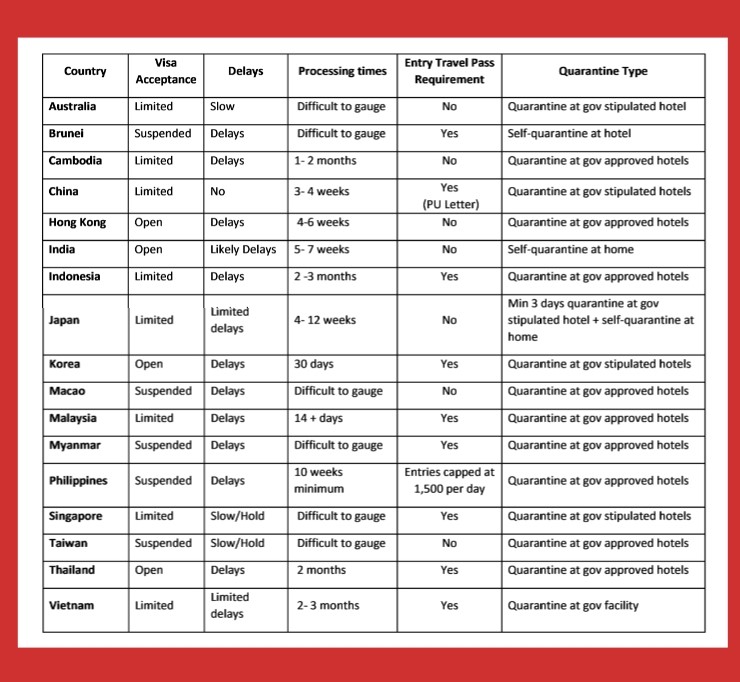In 2020 we addressed the coming surge and the challenges to consider when re-starting relocations.
Over the course of the year, while attending conferences and holding client meetings, the message received is that companies have continued hiring and planning assignments. In parallel, everyone is working to ensure their supply chains are a strong as can be expected. As the industry does its best to prepare, assignees are waiting with packed bags, but there is silence regarding how many, how soon, and when employers plan to send them.
The Challenge Illustrated
Last year, we lacked a good example of how the supply chain will be challenged when relocations start again in earnest. Each part of the industry likely faces different problems, but the Household Goods industry offers us insight into the complexity we face.
industry likely faces different problems, but the Household Goods industry offers us insight into the complexity we face.
First, ports have been limited and sometimes closed. Second, staffing shortages at the ports have left containers sitting at sea for weeks at a time, awaiting inspection. Third, the consumer reliance on home delivery for everything has created a packing materials shortage. Fourth, the shipping containers are all sitting in the wrong place for where they are needed today. Finally, there is quite simply more profitable cargo to haul. The result is shipping household goods has become more expensive. Simon Sundboell, CEO of eeSea, anticipates a normalization of shipping will not be seen until the second half of 2022.
Other industries also provide a glimpse into our collective future. In July, American Airlines culled about 1% of its flights to alleviate potential strain on operations. In addition, car rental companies have low availability of vehicles, and hotels face staffing shortages as they try to meet the increased demand.
For Relo Network Asia, we have our team in place and are ready to continue supporting employees on the ground. However, we have yet to see an increase in demand that we cannot handle, and challenges crossing borders and obtaining visas are helping to level out the arrival of new expatriates.
see an increase in demand that we cannot handle, and challenges crossing borders and obtaining visas are helping to level out the arrival of new expatriates.
We report weekly on the status of borders in all our locations, including the measures to keep out imported infections. Quarantine requirements, especially those in government facilities or mandated facilities, also to varying degrees regulate the number of arrivals. Fifteen of our 17 destinations require quarantine at a directed location. The number of available rooms varies by city but across all areas limits the number of people who can arrive. Some places such as the Philippines have put a cap on the total of permitted arrivals per day. Others control the arrivals by requiring that travelers obtain official permission to arrive in-country, including specified travel dates.
Beneath the Surface
A hidden backlog is also developing based solely on the processing of new visa applications. Out of our 17 locations alone, five countries are processing new visa applications, eight countries are only doing limited or partial processing, and four have currently suspended processing.
Each situation creates a different hurdle to clear. For countries that have continued processing visas during this period of restricted borders, opening those borders can create a surge of requests for hotels, temporary housing, and destination services. Those who have suspended processing face a flood of applications which is likely to drown the government departments that manage them.
The majority of countries are doing limited or partial processing. But between restricted borders and local restrictions limiting the functions of local offices and consulates, these too are creating backlogs for either processing or available resources and services.

The Position Requires Partnership
These scenarios represent a once-in-a-lifetime event which no business can meet without mitigation, no matter how big or small. One scroll through LinkedIn reveals that, across the board, the companies that support relocating employees are building capacity. But we need employers to prioritize their waitlists and to coordinate closely with their supply chain.
Shortages, backlogs, extended timelines, and increased costs. These are impacting every industry and every aspect of our industry. Relocation, Mobility, and HR managers have grown to become strategic partners to their organizations. To keep their companies moving forward, they now also need to become expert project managers. It will take nothing short of a coordinated effort to create a smooth transition for employees into their new office or assignment. We hope the information provided here will be helpful towards those efforts.




